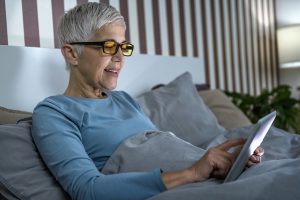
According to some, “harmful” blue light rays can boost the likelihood of age-related macular degeneration (AMD) and cause retinal damage.
This might resonate with you. If you notice dry or strained eyes after looking at your computer, tablet, smartphone, or television screen, you could quickly form the impression that something damaging is taking place.
But don’t believe the hype when it comes to these rays being damaging.
Do you know what the most significant source of blue light in your life is? The sky. In fact, your screens emit so little of it—and many even have blue light controls—that they do little to boost exposure. Quite frankly, your eyes are built to receive blue light.
Currently, data does not support the theory that blue lights cause or contribute to AMD, the leading cause of vision loss in older Americans, or other structural eye damage.
One area where they may help, however, is with sleep. Your natural circadian rhythm—the body’s internal clock—is primarily regulated by natural light exposure. When the sun goes down, natural blue lights are essentially gone. The darkness signals sleep is coming.
Looking at blue light in the evening may slow melatonin production and stimulate areas of the brain associated with wakefulness. For this reason, blue-ray blocking glasses might be useful.
But what about your dry, strained eyes? That’s likely the result of looking at screens too long without a break. To remedy that, try using the 20-20-20 rule: every 20 minutes, take your eyes away from the screen and focus on something 20 feet away for 20 seconds.
Doing that will give your eyes a rest, allow you to blink, and reduce the likelihood of eye strain and dry eyes.
To improve your eyes’ structural integrity, it’s advised to eat a nutrient-rich diet rich in omega-3 fatty acids and antioxidants. Leafy greens, and plenty of other colorful fruits and vegetables, may help protect you from conditions like AMD.
So, do you need blue ray glasses to keep your eyes healthy? Certainly not. But if you’re looking at screens most of the evening and not using features to limit blue light, they may be useful to help promote better sleep.